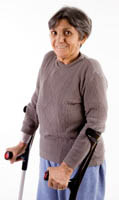About Us
 The Centers for Disease Control and Prevention (CDC) has been involved in disability and health activities since 1988. The mission of the CDC Disability and Health Team is to promote the health, well-being, independence, productivity, and full participation in society by people with disabilities.
The Centers for Disease Control and Prevention (CDC) has been involved in disability and health activities since 1988. The mission of the CDC Disability and Health Team is to promote the health, well-being, independence, productivity, and full participation in society by people with disabilities.
Monitoring the Health of People With and Without Disabilities
CDC monitors the health of people with and without disabilities to identify how health issues affect people in different ways and why some people are at higher risk for certain diseases and conditions. Studies have shown that people with disabilities are more likely to have poorer overall health, less access to adequate health care, and increased risk for preventable health problems. These data are important to help identify barriers to achieving good health, and to design prevention and health promotion programs aimed at reducing health disparities and improving the health of people with disabilities.
Promoting Public Health
CDC supports work that improves overall health and quality of life for people with disabilities. It supports the inclusion of people with disabilities in public health programs that prevent disease and promote healthy behaviors and safety, while working to eliminate barriers to health care and improve access to routine preventive services.
Healthy People 2020 currently is under development and will reflect assessments of major determinants of health and wellness, changing public health priorities, and emerging issues related to our nation's health preparedness and prevention.
Healthy People 2010
Healthy People 2010 provides a framework for prevention for the nation. It is a statement of national health objectives designed to identify the most significant preventable threats to health and to establish national goals to reduce these threats.
Disability and Secondary Conditions: Focus Area 6 is the Healthy People 2010 goal to promote the health of people with disabilities, prevent secondary conditions, and eliminate disparities between people with and without disabilities among the U.S. population.
Educating Families, Professionals, and the Public
 CDC educates families, professionals, and the public by supporting training programs and conferences to exchange information and facilitate dialogue across a variety of health professions. For those interested in the field of disabilities, CDC offers trainings to health professionals, disseminates information, and promotes educational materials to various audiences, as well as responds to public inquires.
CDC educates families, professionals, and the public by supporting training programs and conferences to exchange information and facilitate dialogue across a variety of health professions. For those interested in the field of disabilities, CDC offers trainings to health professionals, disseminates information, and promotes educational materials to various audiences, as well as responds to public inquires.
Promoting Policy
CDC promotes the development and implementation of policies that integrate disability information into broad public health programs.
Supporting Intervention Strategies
People with disabilities are at risk for developing secondary conditions such as pain, fatigue, obesity, and depression. These additional physical or mental health conditions can occur as a result of having a primary disabling condition. CDC aims to reduce the amount and severity of secondary conditions by working with a variety of partners to carry out intervention strategies and disseminate information and resources specifically to people living with disabilities.
Conducting Research
CDC has supported research into the development of specific interventions to lessen the effect of disability. These activities identify risk factors related to the health of people with disabilities. National and state health survey data on health status, quality of life, functioning, and disability issues are used to inform the development and evaluation of evidence-based health promotion interventions, such as those that address the transition of youth from school age to adulthood.
Contact Information
Mailing Address:
Disability and Health Program
Division of Human Development and Disability
National Center on Birth Defects and Developmental Disabilities
Centers for Disease Control and Prevention
1600 Clifton Rd., MS-E88
Atlanta, GA 30333
Phone: 1-800-CDC-INFO (232-4636)
Fax: 404-498-3060
E-mail: cdcinfo@cdc.gov
Questions??
If you have questions about disability and health, please send CDC an e-mail at cdcinfo@cdc.gov.
Contact Us:
- Centers for Disease Control and Prevention
National Center on Birth Defects and Developmental Disabilities
Division of Human Development and Disability
1600 Clifton Road
MS E-88
Atlanta, GA 30333 - 800-CDC-INFO
(800-232-4636)
TTY: (888) 232-6348
New Hours of Operation
8am-8pm ET/Monday-Friday
Closed Holidays - cdcinfo@cdc.gov



